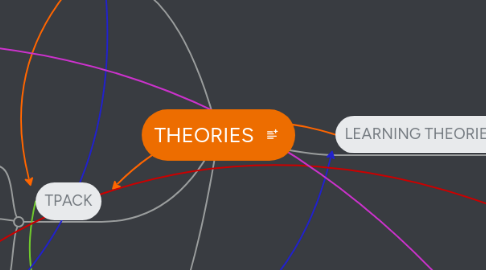
1. LEARNING THEORIES
1.1. COGNITIVE LOAD
1.1.1. memory can be damaged if only dependent on working memory
1.1.1.1. the information from the short-term memory is passed on to the long-term memory to be stored.
1.1.2. Schemas are built the connection between long-term memory and short-term (working) memory.
1.2. CONNECTIVISM
1.2.1. learning happens through different social networks and connections
1.2.2. easy for students to connect with new information, contacts and find information faster.
1.2.2.1. students can find experts, scholarly articles, videos, lectures etc. to support and build their knowledge
1.2.3. tools/connections are important and long lasting
1.3. BEHAVIORISM
1.3.1. focussing only on observable behavior.
1.3.2. started by Ivan Pavlov and his idea of classical conditioning.
1.3.2.1. CC can be used to create an association between environmental effects and naturally occuring stimulus.
1.3.3. Classical conditioning: learning behaviors through conditioned associations.
1.3.4. He introduced the effects of punishment and reinforcement on behavior.
1.3.4.1. Skinner's theory: learning is done by change and behavior that are seen through by a person's response to stimuli.
1.4. CONSTRUCTIONISM
1.4.1. our learning is constructed on prior knowledge.
1.4.1.1. prior knowledge impacts and alters our understanding of new information
1.4.2. focuses challenging projects and involves the experts in community.
1.4.2.1. we take what we already know and based on that we understand new information
2. TECHNOLOGY THEORIES
2.1. MEDIA ECOLOGY
2.1.1. study of media as an environment.
2.1.2. All the technology we use plays a large role in human learning.
2.1.3. looks at how communication through media affects people's point of views.
2.2. SCOT
2.2.1. opposite of Media ecology.
2.2.2. Humans shape technolgy, not the other way around.
